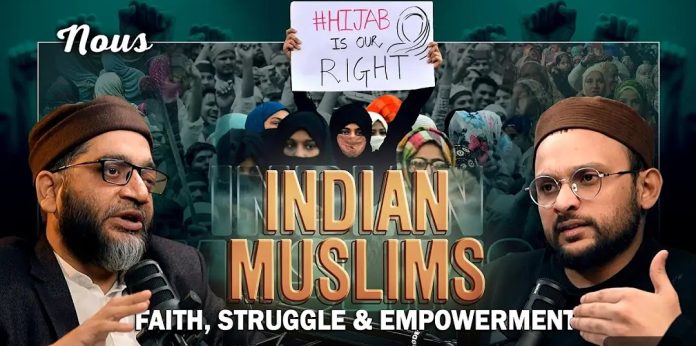“The real crisis of Muslims today consists of two major challenges. The first is optics-driven secular politics, which prioritizes symbolic gestures over substantive empowerment. The second is identity-driven communal politics, which thrives on polarization and division. Jamaat-e-Islami Hind is as much a spiritual movement as it is a political one, striving to address both these issues through a comprehensive approach rooted in justice, education, and social reform.”
These were the words of Syed Sadatullah Husaini, Ameer (President) of Jamaat-e-Islami Hind (JIH), in a recent in-depth interview on Challenges & Solutions | Syed Sadatullah Husaini (JIH President), conducted by Nous Network and available on their YouTube channel.
Syed Sadatullah Husaini, Ameer (President) of Jamaat-e-Islami Hind (JIH), shared profound insights into his personal journey, the organization’s vision, and the challenges faced by Indian Muslims today.
Early Life and Association with JIH
Born on June 7, 1973, Telangana, Husaini grew up in an environment deeply influenced by Islamic teachings and social service. His father, a civil engineer and preacher, ensured a strong foundation in religious education. Husaini’s formal association with JIH began in 1990 when he joined the Students Islamic Organisation of India (SIO). Over the years, he rose through the ranks, serving as the National President of SIO before assuming leadership as the Ameer of JIH.
Vision and Structure of Jamaat-e-Islami Hind
JIH, founded by Maulana Maududi, is structured to uphold Islamic values and promote social justice. Husaini emphasized that the organization’s vision extends beyond religious discourse, encompassing social, educational, and political engagement. JIH’s decentralized structure enables grassroots activism, ensuring that its initiatives resonate with local communities nationwide.
Ideological Foundations and Nationalism
Discussing JIH’s ideological underpinnings, Husaini elaborated on Maududi’s concept of Islam as a complete way of life. Addressing nationalism, he distinguished between territorial nationalism and cultural nationalism, asserting that while patriotism is natural, it should not devolve into exclusionary chauvinism.
Partition and Historical Perspectives
Husaini reflected on Maulana Maududi’s stance during the partition, emphasizing that Maududi was critical of the two-nation theory and instead advocated for a united India where Muslims could practice their faith freely. This historical perspective underscores JIH’s enduring commitment to communal harmony.
Jamaat-e-Islami Hind vs. RSS: A False Equivalence?
When asked about comparisons between JIH and the Rashtriya Swayamsevak Sangh (RSS), Husaini firmly rejected such parallels. While both organizations are ideological, their philosophies and methodologies differ starkly—JIH’s approach is rooted in justice and inclusivity, whereas RSS promotes a rigid interpretation of cultural nationalism.
Engagement in Electoral Politics
JIH’s stance on electoral politics has evolved over time. Initially focused on social and educational reforms, the organization has now recognized the necessity of political participation to safeguard constitutional values and advocate for marginalized communities. Husaini stressed that political engagement is essential for meaningful social transformation.
Contemporary Challenges: Hindutva and Islamophobia
Husaini expressed grave concerns over the rise of Hindutva politics and Islamophobia in India. He described Hindutva as an exclusionary ideology that threatens India’s pluralism. To counteract these forces, he called for proactive engagement, interfaith dialogue, and efforts to dispel misconceptions about Islam.
JIH’s Response to Current Issues
In response to contemporary challenges, JIH has initiated several programs, including educational initiatives, legal aid for victims of discrimination, and community development projects. Husaini emphasized the importance of building alliances with civil society organizations to tackle hate crimes and systemic biases collectively.
Vision for Indian Muslims
Looking forward, Husaini envisions an empowered, educated, and socially responsible Muslim community in India. He underscored the importance of internal reform, focusing on education, economic development, and adherence to Islamic ethics. By fostering self-reliance and active civic engagement, Indian Muslims can contribute meaningfully to national progress.
Philosophical Reflections: Sabr and Tawakkul
In facing adversity, Husaini emphasized the Islamic principles of Sabr (patience) and Tawakkul (trust in God). He highlighted that these values provide spiritual resilience and inspire proactive efforts for social justice rather than passive acceptance of oppression.
Conclusion
Syed Sadatullah Husaini’s insights offer a comprehensive roadmap for Indian Muslims navigating the challenges of the modern era. His emphasis on education, justice, and active participation presents a vision for a resilient and harmonious society.
This insightful discussion is available on Nous Network’s YouTube channel under the title Challenges & Solutions | Syed Sadatullah Husaini (JIH President), providing a thought-provoking analysis of faith, resilience, and the future of Indian Muslims.
For the full video : https://youtu.be/-JqhfOd5peI?si=lQ7zPxGlZFWc4y-R




